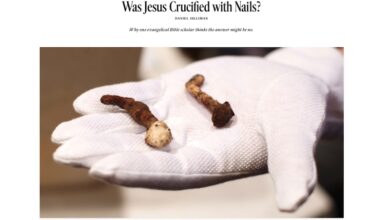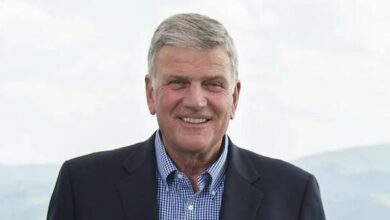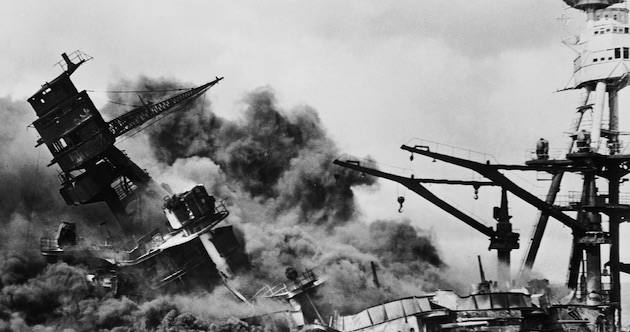
I was born December 5, 1941, two days before the Japanese attack on Pearl Harbor that brought the United States into the Second World War.
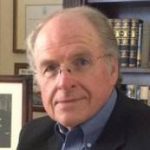
Many years later I could hardly believe that I was shaking the hand of the Japanese pilot who had led the attack on Pearl Harbor. Even more astonishing, I met Fuchida at an American church where he had just preached.
After the war Fuchida became a Christian, and then an evangelist, proclaiming the Gospel throughout Japan and the world. Fuchida had been moved by Christian testimonies, and gave his life to Christ after reading a tract by a former American POW in Japan, Jacob DeShazer, who had returned to Japan as a missionary.
DeShazer would not have been there had it not been for the American general who was hailed as Japan’s conqueror, but who also opened the way for the Christian Gospel to enter Japanese society.
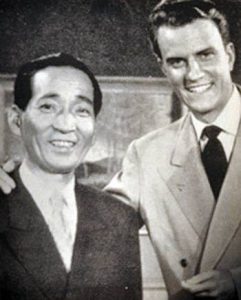
General Douglas MacArthur faced immense challenges when he was assigned to help the Japanese rebuild their nation following the devastation of the Second World War. The country’s national pride was broken, government in shambles, economy shattered, and educational system in ruins. Atom bombs had leveled much of the major cities of Hiroshima and Nagasaki.
As Supreme Commander for the Allied Powers in Japan, MacArthur had been given sweeping powers to reconstruct the society and its infrastructure. MacArthur may not have been a theologian, but he read his Bible daily, carrying it with him everywhere he went. Though he likely knew few details of the doctrine of God’s transcendence, MacArthur intuitively sought to set its principles at the core of the new Japan.
MacArthur felt that “the problem” with the human race and wars “basically is theological.” This, he said, “involves a spiritual recrudescence and improvement of human character that will synchronize with our almost matchless advances in science, art, literature and all material and cultural developments of the last two thousand years. It must be of the spirit if we are to save the flesh.”
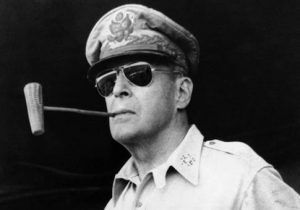
MacArthur believed Christianity to be the answer for the Japanese. “I asked for missionaries and more missionaries,” he wrote in his memoir, Reminiscences. “Whenever possible I told visiting ministers of the need for their work in Japan,” he said. “The more missionaries we can bring out here, and the more occupation troops we can send home, the better.” At MacArthur’s request, the Pocket Testament League provided ten million Bibles in the Japanese language.
MacArthur has been criticized by some historians. Perhaps his use of religion was strictly utilitarian. However, his own convictions were that the right spirituality is essential for improvement of personal character and healthy civilization. Christianity would be the organizing center for all human endeavors that would provide the order and peace that heal fragmentation and conflict.
History does not repeat itself, but it does rhyme, to paraphrase Mark Twain. In the rhyming historic cycles spinning around the line of finite time, we are again at the place where MacArthur’s age stood decades ago. We must have now a “spiritual recrudescence,” a revival of the understanding of God’s transcendent holiness of being as the standard for all human endeavor—not merely for the sake of us enjoying a happier, safer life, but because God merits our adulation.
Many nations have turned away from the consciousness of God’s transcendent majesty, and the accountability, stability, and freedoms that accompany that worldview.
In its place “spiritual Samurai” movements are rising up. Arrogant slash and burn politics, demagogic secularism, growling, stomping lawlessness, unfettered greed and the materialism that goes with it, and cold technology are all vying to fill the transcendence vacuum at the heart of our cultures.
MacArthur’s view of Japan following the war, and especially Pearl Harbor, must inspire us now to look for that which is higher and greater than humans and their movements that pretend to the throne of the “Most High.”
Such a movement must begin in the churches. As Alexis de Tocqueville understood in observing the early American nation, as goes the church so goes the country. In the mad embrace of facile church growth movements too many congregations have pandered to the immanent. Many pulpits have made “us” and our well-being the center of focus. Music passed off as “praise” is geared to make us happier and more content.
Churches must recover true worship, the spirit-and-truth variety that lifts the focus to the vertical scale, until people and their institutions—including their governments—see God “high and lifted up.” Isaiah 6 shows that such a vision of God’s transcendence transformed Isaiah’s understanding of the purpose of society, and the need in his personal life and culture for repentance and alignment with God’s holiness.
Isaiah began with himself: “Woe is me… for I am a man of unclean lips…” (Isaiah 6:5) We wait for the “nation” to turn back to God, but that won’t happen until we as the church within the nation cry out, “Woe is us… for we have let the culture reduce us to an enchantment with the immanent to the point that we have lost the vision of God’s absolute holiness and grandeur!”
When the church in the nation unleashes true worship of the Most High, we too will discover that “it must be of the spirit if we are to save the flesh.”
–Wallace Henley is senior associate pastor at Houston’s Second Baptist Church, and Chair of Belhaven University’s Master of Ministry Leadership degree. He is a former White House and Congressional aide, and co-author of “God and Churchill”, with Winston Churchill’s great-grandson, Jonathan Sandys.



